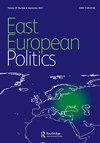The language of political incorporation: Chinese migrants in Europe
IF 3.1
2区 社会学
Q1 AREA STUDIES
引用次数: 0
Abstract
The Language of Political Incorporation is a remarkable book. In it, Amy H. Liu explores how migrant networks shape the political incorporation of migrant populations, ranging from engagement with local authorities to civic involvement. Liu studies this relationship using original data that she collected over five years in Chinese migrant communities in Hungary, Bulgaria, Romania, Serbia and Croatia. While the scope of her fieldwork alone is impressive, Liu also shows that the arguments set forth in the book generalise beyond Central-Eastern Europe and its Chinese migrant communities. The literature that explores migrant inclusion tends to either focus on the individual (migrant) or the country (host or home). Liu breaks new ground by focusing on a different unit of analysis altogether: the migrant network. A migrant network consists of migrants and brokers who help migrants find lodging, secure jobs and navigate host country bureaucracy. Liu’s theory identifies two types of networks, defined by language: bridging and bonding. A bridging network is built around a lingua franca, like Mandarin. If a language that connects migrants is spoken by many diverse individuals – not only from different parts of the country but also, possibly, from communities in other countries that speak the same language – network entry barriers are lower and membership is more diverse. Brokers can therefore recruit clients from a large community and have less to lose reputationally when service provision falters. Members of bridging networks automatically interact with others who speak the lingua franca, but who might be from an outgroup. This regular contact, posits Liu, leads to building intergroup trust, which is then reinforced by the benefits that a member accrues from the network. Since intergroup trust is instrumental for political incorporation, Liu suggests that we should expect to find more incorporation in bridging networks. A bonding network is built around a language that is only spoken by a select group of migrants (e.g. Zhejiangese). Brokers who provide services to migrants in bonding networks are typically better at delivering services, partly because group homogeneity leads to a better understanding of members’ preferences and partly because brokers’ reputations are built on a small constituency that extends back to the home country. Because membership in a bonding network is language-dependent, such networks are both exclusionary and homogenous. As a result, members are more likely to interact with ingroup members on a daily basis, building less intergroup trust. Less intergroup trust, in turn, likely leads to less political incorporation. Liu then situates networks in the political space and studies their reactions to government policies that target migrants – directly or indirectly. Bonding networks produce stronger relationships and are better able to withstand shocks. Bridging networks, however, are more diverse and thus more sensitive to shocks. In a diverse community, it is easier to point fingers at outgroup members when something goes wrong. And when brokers serve a larger community, their reputation suffers less when they are unable to help during a crisis.政治结合的语言:欧洲的中国移民
《政治结合的语言》是一本了不起的书。在这本书中,艾米·h·刘探讨了移民网络如何塑造移民人口的政治融合,从与地方当局的接触到公民参与。Liu用她在匈牙利、保加利亚、罗马尼亚、塞尔维亚和克罗地亚的中国移民社区收集的原始数据研究了这种关系。虽然她的田野调查范围令人印象深刻,但她也表明,书中提出的论点超越了中欧和东欧的中国移民社区。探讨移民包容的文献往往要么关注个人(移民),要么关注国家(东道国或家乡)。刘通过关注一个完全不同的分析单元开辟了新的领域:移民网络。一个移民网络由移民和中介组成,他们帮助移民找到住处、稳定的工作,并与东道国的官僚机构打交道。刘的理论将网络分为两种类型,由语言定义:桥接和纽带。一个桥接网络是围绕一种通用语建立的,比如普通话。如果一种连接移民的语言是由许多不同的人使用的——不仅来自该国不同地区,而且可能来自其他国家讲同一种语言的社区——网络进入的门槛就会降低,成员也会更加多样化。因此,经纪人可以从一个大的社区中招募客户,并且在服务提供不稳定时声誉损失较少。桥接网络的成员会自动与其他说通用语言的人互动,但这些人可能来自外部群体。刘认为,这种定期的接触可以建立群体间的信任,然后通过成员从网络中积累的利益来加强信任。由于群体间信任有助于政治整合,刘建议我们应该期待在桥接网络中找到更多的整合。一个联系网络是围绕一种只有少数移民(如浙江人)使用的语言建立起来的。在纽带网络中为移民提供服务的经纪人通常更善于提供服务,部分原因是群体同质性导致更好地了解成员的偏好,部分原因是经纪人的声誉建立在一个延伸到母国的小选区上。因为在一个结合网络中的成员是依赖于语言的,这样的网络既是排他性的,也是同质的。因此,成员更有可能每天与内部成员互动,从而减少了群体间的信任。群体间信任的减少,反过来可能导致政治结合的减少。然后,刘将网络置于政治空间中,研究他们对政府针对移民的直接或间接政策的反应。结合网络产生更牢固的关系,并能更好地抵御冲击。然而,桥接网络更加多样化,因此对冲击更敏感。在一个多元化的社区里,当出现问题时,人们更容易把责任推到群体外的成员身上。当经纪人服务于一个更大的社区时,当他们在危机中无法提供帮助时,他们的声誉受到的影响会小一些。
本文章由计算机程序翻译,如有差异,请以英文原文为准。
求助全文
约1分钟内获得全文
求助全文

 求助内容:
求助内容: 应助结果提醒方式:
应助结果提醒方式:


